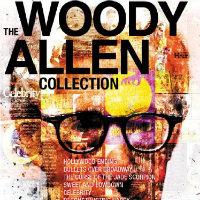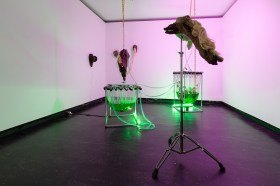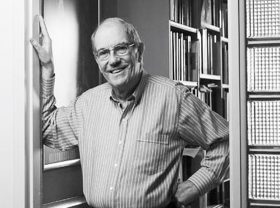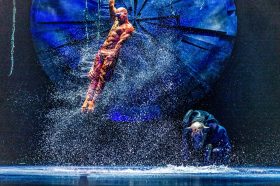At most, there was a bit of a dip. But when his ’70s work contains the likes of Bananas, Sleeper, Annie Hall and Manhattan; when his ’80s work has films such as Zelig, The Purple Rose of Cairo and Hannah and Her Sisters; when his early ’90s period has Shadows and Fog and Manhattan Murder Mystery, and his most recent work has the form of Vicky Cristina Barcelona, Whatever Works and Midnight In Paris… it’s all too easy to paint the period covered by this new Woody Allen box set (1994-2002) as his career nadir, and not just because that rhymes.
Is this timeframe really a career low for the man, or does it just look that way because the rest of his filmography is littered with classics?
Ignore the seemingly-random order in which this ten disc set itself is put together – it seems to think you should start in 2002, jump back to 1994, then continue in 1999, jump back to 1998, etc. We choose to begin chronologically with 1994’s Bullets Over Broadway. John Cusack is the Woody proxy here, the brilliant young 1920’s playwright who can only get his new work off the ground by accepting mob money, a deal which means accepting the mob boss’s girlfriend in a leading role.
That setup alone is ripe enough for Allen’s unique style, but when the film’s actual hook arrives halfway through the film, you realise that he’s got bigger things in mind. And that’s a theme that will recur each and every time in this set.
1995’s Mighty Aphrodite is part Greek tragedy, part Pygmalion, part Comedy of Errors. Allen acknowledges the incongruity of the colliding genres with the Greek Chorus, which hilariously begins speaking collectively in modern day New York colloquialisms. But amidst the hilarity, we remember that Allen is a master dramatist, and we feel a genuine, emotional connection to the characters and their situation. Allen is able to be clever without being distancing, and Mighty Aphrodite is perhaps the best example of this.
Then we come to a personal favourite: 1996’s Everyone Says I Love You is his stab at a musical, with movie stars such as Julia Roberts, Goldie Hawn, Natalie Portman and Tim Roth (but not Drew Barrymore, who insisted on a singing double) awkwardly warbling along to various classics. From Edward Norton’s brilliantly geeky table-top dance in the jewellery store, to the beautiful and extraordinary dance sequence at the end, this is easily one of Allen’s most underrated works. Musicals evoke a special type of joy, and here he nails that feeling perfectly.
1997’s Deconstructing Harry could so easily be construed as a personal admission from him, a public self-examination in the wake his marital scandal. And that’s because it is. It’s all-too-common for audiences to mistake the opinions of the artists with the opinions of their characters, but Allen is making no bones about the cinematic therapy he’s undergoing here. He’s also keen to pull us out of our comfort zones, employing grating jump cuts and a deliberately uncomfortable aesthetic that prevents us from becoming too complacent. For all of Allen’s brilliance, many of us still use his films as comfort food, and many will throw on an old classic to relax with. This is something that cannot be done with Deconstructing Harry, funny though it is. It is a modern classic, and arguably the best film of this decade.
He followed that film up with 1998’s Celebrity. It’s primarily remembered for Leonardo DiCaprio’s appearance and Kenneth Brannagh’s unapologetic Woody impersonation, but it’s so much more deft than that. Allen is making a very pointed statement about the cult of celebrity, damning its excesses and praising its benefits in equal measure. Contrast the experiences of Judy Davis’s Robin with the superficial encounters of Kenneth Brannagh’s Lee. This film is not just an excuse for hilarious scenes featuring vapid celebrities (although there is plenty of this); Allen’s got something to get off his chest.
1999’s Sweet and Lowdown arguably enjoys the best reputation of the selection. It was a film that Allen had been wanting to make since the beginning of his career, a biopic of a fictitious guitarist modelled vaguely on Django Reinhart. It’s a masterful work, and one so expertly constructed that it actually fooled your reviewer upon his first viewing. Sean Penn is extraordinary as the mythical Emmet Ray, and Samantha Morton all but steals the show as the mute Hattie.
It’s at this point that, for many, the wheels come off the wagon. 2000’s Small Time Crooks promised big, with its evocative poster, the suggestion of a fun heist film during a resurgence in that sub-genre, and the then-appealing idea of Hugh Grant foppishly performing Woody Allen-scripted bon mots. We didn’t really get much of that, but what we did get is, perhaps, unfairly overlooked. Woody Allen plays a criminal with delusions of grandeur, and Tracey Ullman his long-suffering wife. Although the plot is pretty much dispensed with less than halfway through the film, it’s the strength of the characters that pulls the whole thing through. For all the talk of Allen’s films being cynical, intellectual exercises, there is a permeating sweetness that is never more apparent than it is here.
Perhaps it’s the weight of expectations that have marred this period of Allen’s career. For if we were expecting a high-comedy heist film in Small Time Crooks, we were definitely anticipating a Dashiel Hammett-style noir in 2001’s The Curse of the Jade Scorpion. And, to be fair, that is sort of what we got. Sort of. Helen Hunt doesn’t quite fit the bill as the sassy female lead, and the lack of chemistry between her and Allen does put a damper on the proceedings that the film never really recovers from. But ultimately it’s a fun romp, featuring twists on many of the genre’s recognisable tropes and more than enough funny lines to ensure its rewatchability.
The collection rounds out with 2002’s Hollywood Ending, and this is where it gets tough. The tone of this review has been unerringly positive, because I love every Woody Allen film I’ve seen. Genuinely and truly. But here’s the conundrum: do I attempt to reflect the vast, vast majority of people – die-hard Woody Allen fans included – who loathe Hollywood Ending, or do I confess that I actually quite like it? If this review is to be of any use to you, I must tell you that, statistically, you will likely hate this film. You will probably find it flat, uninspired, forced and dull. However, if you’re in the infinitesimally small percentage of people who, like myself, enjoy this film, you’ll be amused by the concept of a struggling director who suddenly goes blind on the first day of his make-or-break film; you’ll love Debra Messing as the ditzy wannabe actress delighted by what should be a shattering turn of events; you’ll be a little teary when you realise that the relationship Woody Allen’s Val has with his son is painfully close to Allen’s real life. That’s the real Hollywood ending that Allen so desperately wants and, to date, has not had.
The discs themselves, it must be said, are devoid of extras. Allen has never wanted to record a commentary track, and there’s not even trailers as appeasement. But, on the final disc and presented as a special feature unto itself, is Wild Man Blues, the 1997 documentary about Woody Allen’s jazz tour of Europe. It’s fun stuff, although Allen comes off as a little grumpy and disengaged, which is a bit dispiriting for those of us who hoped for a little more than a glimmer of his on-screen personality. But it is insightful, and the scene in which he visits his parents – yes, his parents were still alive and kicking in the late 1990s – is truly priceless.
Watching so many of his films in such close proximity, what’s striking – and rarely discussed – is how high concept Woody Allen’s work is. When we hear the term ‘high concept’, we tend to think of big science fiction ideas, or some elaborate mashup of genres or iconography. And yet, every single one of these films is operating from a very big ‘what if?’ place.
He could so easily dwell within the realm of the introspective dramas and comedies, safe in the critically-lauded niche he’d long since carved out for himself. But although his films all contain instantly-recognisable elements, each one pushes him into a new area. What if a nebbish New Yorker found himself in the midst of a Greek tragedy? What if we took a modern-day stab at a classic musical, filmed across New York, Venice and Paris? What if a director has to make an entire film whilst blind without anyone catching on? These are big, exciting ideas, and although the results are of mixed quality, they are always worth the watch.
So, ultimately, what is the use of this box set? It’s a collection of films across a distinct period of time, many of which would not individually be snapped up as would his other classics. Grouped together, they become more than the sum of their parts: an example of a great filmmaker whose work is overshadowed by the fact that he has bookended them with some of cinema’s most enduring classics. And that’s the best problem to have.
The Woody Allen Collection
Now available through Reel DVD/Roadshow
RRP $99.95
Rated M





